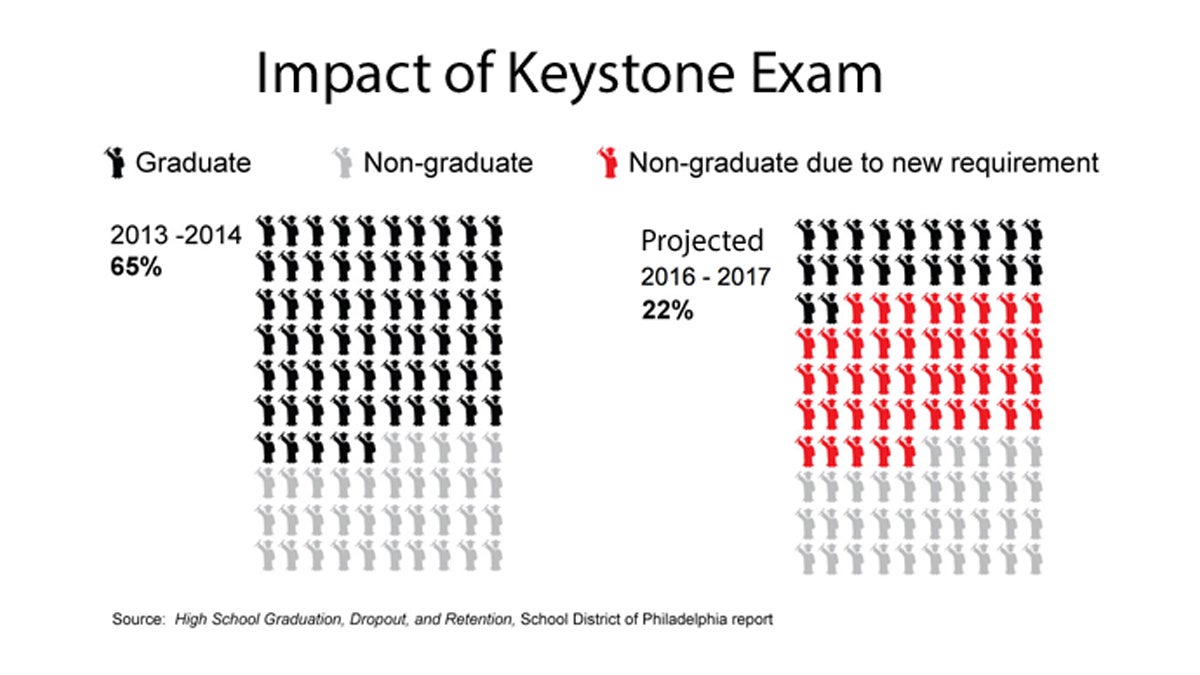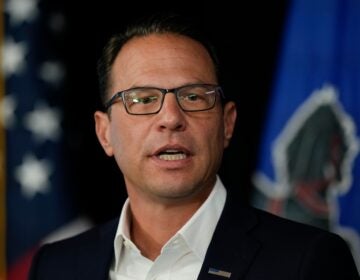Philly school district projects 22 percent graduation rate in 2017
Listen
Graph: Projected impact of Keystone exams on Philadelphia graduation rates. (Rachel Feierman/WHYY)
In two years, Pennsylvania students will have to pass three standardized tests — the Keystone Exams — to graduate high school.
Right now, 65 percent of Philadelphia School District students graduate in four years, but district officials expect a big drop when the Keystone Exam requirement comes into full effect.
“While our graduation rate remained steady last year, extrapolating from current seniors, only 22 percent of the Class of 2017 will graduate on time,” according to a report published by the district in January. That estimate is based on the number of current seniors on track to pass all three Keystone Exams and obtain the requisite class credits to graduate this spring.
In 2008, Gov. Ed Rendell’s administration called for statewide Graduation Competency Assessments (GCA). These would become the Keystone exams. The State Board of Education approved the graduation requirement in 2009. Since then, use of the Keystone tests to determine graduation has triggered debate at the state and local level.
States use graduation requirements to assess school performance and ensure graduates are prepared for college or the workforce. Fully 70 percent of students at the Community College of Philadelphia need to redo high school-level course work before moving on to college-level classes.
Under Gov. Tom Corbett, the number of tests to be rolled out in schools was reduced from 10 to three: biology, algebra I and literature. The Corbett administration also pushed back the year when the tests would officially count toward a student’s graduation to the 2016-2017 school year. In other words, current high school sophomores.
Getting ready for the tests
Philadelphia is not alone in posting test scores that would hit their graduation rates.
While students must pass all three tests to graduate, across-the-state scores for the biology test drag down the average. Last year, about 54 percent of Pennsylvania students taking the tests passed the biology Keystone.
Scores were especially low in urban school districts including Allentown, where only 18 percent of its students passed the biology Keystone in 2014. Wealthier suburban districts – such as Lower Merion with a 71 percent passing rate for biology — fared better.
Those scores pose a “formidable barrier” to graduation, according to Chris Shaffer, deputy chief of curriculum, instruction and assessment with the Philadelphia district. But there is another option for the kids who can’t pass the exams.
“If students are unable to demonstrate proficiency on the Keystone, they would be required to complete a PBA, a project-based assessment,” said Shaffer.
However, those project-based assessments, said Shaffer, come at a cost. Schools end up taking on more staff to help kids who’ve failed and to shepherd students through their project-based assessments, both required under the law that authorized the Keystone Exams.
“For a school district that’s underresourced, underfunded and underserved … that money isn’t there,” said Shaffer.
Kelley Collings, a English language teacher and activist against high-stakes testing in Philadelphia, puts it more bluntly. “These project-based assessments are the most bogus unfunded mandate that the school district has faced in a long time,” Collings said.
Still, the Philadelphia School District is getting “creative” to bring students’ performance up to par, according to Shaffer. To get students ready for the projects, schools must provide “supplemental education.” In other words, they must offer remedial instruction for students who fail the exams.
To gear up, “what we have next year going out are 18 what we call Keystone project managers, and they’ll be working in our 18 neighborhood high schools working to develop supplemental education programs and project-based assessments,” said Shaffer.
Those extra hands will not be enough to close the gap between the current Keystone pass rate and the Philadelphia graduation rate of 65 percent, said Shaffer, but it’s “a positive step.”
The District has not yet started rolling out project-based assessments, which students complete on a computer and take an average of 10 hours per test to complete, according to the state’s Department of Education website.
Some Pennsylvania lawmakers propose postponing — or even eliminating — Keystone tests as a graduation requirement. Gov. Tom Wolf has not yet taken a stance on changing the exam policy.
Next month, students will sit once again for the Keystone Exams but it will be two more years until their scores are reflected in who gets to don a cap and gown.
WHYY is your source for fact-based, in-depth journalism and information. As a nonprofit organization, we rely on financial support from readers like you. Please give today.




